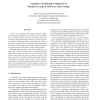Free Online Productivity Tools
i2Speak
i2Symbol
i2OCR
iTex2Img
iWeb2Print
iWeb2Shot
i2Type
iPdf2Split
iPdf2Merge
i2Bopomofo
i2Arabic
i2Style
i2Image
i2PDF
iLatex2Rtf
Sci2ools
IPPS
2006
IEEE
2006
IEEE
Compiler and runtime support for predictive control of power and cooling
The low cost of clusters built using commodity components has made it possible for many more users to purchase their own supercomputer. However, even modest-sized clusters make significant demands on the power and cooling infrastructure. Minimizing impact of problems after they are detected is not as effective as avoiding problems altogether. This paper is about achieving the best system performance by predicting and avoiding power and cooling problems. Although measuring power and thermal properties of a code is not trivial, the primary issue is making predictions sufficiently in advance so that they can be used to drive predictive, rather than just reactive, control at runtime. This paper presents new compiler analysis supporting interprocedural power prediction and a variety of other compiler and runtime technologies making feed-forward control feasible. The techniques apply to most computer systems, but some properties specific to clusters and parallel supercomputing are used w...
Cooling Problems | Distributed And Parallel Computing | Interprocedural Power Prediction | IPPS 2006 | Modest-sized Clusters |
Related Content
| Added | 12 Jun 2010 |
| Updated | 12 Jun 2010 |
| Type | Conference |
| Year | 2006 |
| Where | IPPS |
| Authors | Henry G. Dietz, William R. Dieter |
Comments (0)

